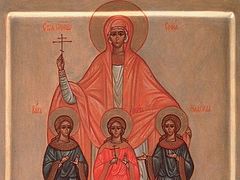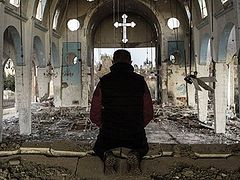The sisters Faith, Hope, and Love (Charity) accepted a martyric death for their faith in Christ. They were beheaded before their the eyes of their mother, St. Sophia, who just a few days later would die of grief on her daughters’ graves. Today many Orthodox Christians also experience suffering for their faith—perhaps not as horrible as the holy martyrs Faith, Hope, and Love, but just difficult in their own way. Often at work, and sometimes at home, people who believe in Christ are judged, others try to persuade them that Christian believers are weak people and that’s why they’ve dreamed up the idea of God Whom they can blame for all their woes. Archpriest Artemy Vladimirov talks about how important as it is for an Orthodox Christian to openly stand for his faith and how to do this.
With respect to today’s feast, we can say the following: Christians endure suffering for their faith that is no less onerous than that of the first centuries when the Gospel news was being spread across the earth. And we are not at all talking about moral humiliation and religious discrimination, but about very real physical persecutions, martyric deaths, mainly at the hands of representatives of a militant trend in Islam—and not only from them. The unfolding of the Banderite[1] Maidan revolution in the Ukraine has increased the number of martyrs for the faith and Christian righteousness from both the clerical ranks and the pious laity, which causes great pain in the hearts of millions of Orthodox Christians around the world, but especially in Russia. Nevertheless, returning to our question of spiritual resistance within our country, it must be said that it occupies a special place in the world, and fully justified are the words of St. Seraphim of Sarov that in Russia is most preserved a living faith in Christ and its corresponding customs, order, and way of life. Nevertheless, everywhere, from the classroom to the workroom, faith and disbelief clash with each other; Christian long-suffering and mercy clashes with insensibility and poorly concealed irritation; an honest word filled with truth and love, with unbridled swearing that includes open blasphemy. There are no hothouse conditions on earth, or practically none. The dignity of a Christian is made known in tribulations, in the ability to overcome temptations. For us leaders remain the words of the apostle Peter, who calls Christians to know how to “give account of their hope” at all times and in every place. And the holy apostle Paul adds that this must be done with all meekness and humility of wisdom, in hopes that the Christian’s word, filled with love and common sense and accepted with faith, will give a person caught in the devil’s nets the opportunity to disentangle himself from them.
The thesis that believers are weak people, it seems to me, is not modern; it’s old fashioned. The people of Donetsk and Lugansk who did not leave their besieged cities and lived through the bombardment and ruin of their homes—are these weak people? St. John the Theologian says that our faith is the victory over the world. The apostle Paul adds, “Oppose the devil and he will run from you. Stand fast in the faith, be courageous, be unwavering, strengthen your weakened knees… Humble yourself under the strong arm of God, and the Lord will raise you up at the right time… You have little strength, but hold on to what you have, so that no one will steal your crown… Be faithful even unto death, and I will give you the crown of life.” These commandments of the Lord call the Christian to the courageous stand against evil, the ability to not capitulate, to not turn tail at the face of aggression, including verbal aggression.
It is my deep conviction that the true Christian is a strong personality. His thoughts should be powerful, bright, clear, and purposeful; Let his word be filled with all-conquering power, that it may shut the mouths of the impious; it is meet that our hearts be strong in meekness and humility. Therefore we should be ready to give a rebuttal with love, benevolence, but also with scrupulousness to those who as a result of the corruption of their own minds and seared consciences try to shake the religious convictions of the Church’s faithful children. If a Christian hears somewhere in the opposite corner of a large room the impious conversation of two people, perhaps he should intrude into this conflict. If the cynical talk is directed right at you, something offensive to the sensibilities of the faithful, you can and should cut it off, calling them to respect the convictions of those around them. Especially fruitful in his answer is the Christian who does not lose his benevolence and bright gaze, who wishes only good to those speaking and therefore does not insult them, does not humiliate them, but gently brings them to reason, disarming the weakness of their ideological position with wise counter-arguments.
Let us learn from Christ in this regard. If you remember, He gazed with sorrow at the Pharisees surrounding Him and grieved over their stony hearts; nevertheless, He did not malign them but meekly taught them, witnessing to the truth. We are called to reciprocate this courageous wisdom and all-persuasive love from the Savior, Who always supports us, teaching and filling our hearts and lips with God’s power. And if you are a true Christian, you can in no way allow yourself to become embittered or even lose your peace. We, the “sons of light”, the “sons of the Kingdom” must also distinguish ourselves from the sons of this age by our outward appearance. Bloodshot eyes, lips trembling with hatred, spraying saliva, flailing arms, and a voice breaking with hysteria—these things are not for us. But only Christ-like silence before the face of a cynical plotter, only meek and powerful words of love and reason, leavened with secret prayer for those who offend and persecute us is what we should have.
May God grant to Orthodox Christians who contemplate this not-so-simple subject, in daily reading of the Gospel and Apostolic Epistles find all that is necessary and sufficient for converse with those near and far, for the acquisition of the art of defending our faith and bringing its enemies to reason in the spirit of truth, meekness, and love.




